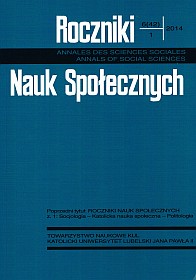Radiowa reklama wyborcza - polecać czy odradzać (uwagi politologa)
Abstrakt
Wydaje się, że w okresie kampanii wyborczej nikt, kto poważnie traktuje swoją walkę wyborczą, nie powinien rezygnować z jakiegokolwiek narzędzia komunikowania się z wyborcami, nawet tak, wydawałoby się nieskutecznego, jakim jest reklama radiowa. Pamiętając o wadach radiowej reklamy wyborczej, wynikających głównie z nośnika, jakim jest radio, a więc o konieczności odbioru treści jedynie przy użyciu zmysłu słuchu, zwyczaju słuchania radia przy okazji wykonywania innych czynności, a także trudnościach w wychwyceniu treści na których zależy sponsorom reklamy i wysokiej fragmentacji rynku oraz rozproszeniu odbiorców, należy pamiętać o zaletach tego narzędzia. W związku z tym, że radia możemy słuchać praktyczne wszędzie, również i radiowa reklama wyborcza ma przez to większe szanse być „odebraną” przez słuchacza. Wydaje się, że gwarancją skuteczności reklamy opartej jedynie na dźwięku jest pamiętanie o przykazaniach Oglivy i spełnienie wszystkich wymogów przedstawionych przez McLeisha, a więc sformułowanie tezy reklamy, prawidłowe napisanie tekstu, wybór odpowiedniego głosu i sposobu mówienia, dobór odpowiedniej muzyki i efektów specjalnych, a także, tu z pewnym zastrzeżeniem, zadbanie o humor w reklamie.
Ryzyko związane z wydatkami poniesionymi na to narzędzie komunikowania możemy dodatkowo zmniejszyć decydując się na emisję radiowych reklam wyborczych jedynie w ramach nieodpłatnych audycji wyborczych w programach Polskiego Radia i jego regionalnych rozgłośniach, pamiętając jednak, że nie wszystkie pory emisji reklam wyborczych są optymalne dla ich nadawców. Bez względu jednak na porę emisji i na fakt, czy zdecydujemy się na płatną reklamę, czy skorzystamy z możliwości nieodpłatnych emisji w ramach audycji wyborczych w radiu publicznym, podstawą skutecznej radiowej reklamy wyborczej jest jej ciekawa forma i treść.
Bibliografia
Dobek-Ostrowska B.: Komunikowanie polityczne i publiczne, Warszawa: PWN 2007.
Cwalina W., Falkowski A.: Marketing polityczny. Perspektywa psychologiczna, Gdańsk: Gdańskie Wydawnictwo Psychologiczne 2006.
Grzegorczyk A.: Reklama, Warszawa: Polskie Wydawnictwo Ekonomiczne 2010.
Janik-Wiszniowska M.: Promocja i reklama polityczna, [w:] Marketing polityczny w teorii i praktyce, red. A. W. Jabłoński, L. Sobkowiak, Wrocław: Wydawnictwo Uniwersytetu Wrocławskiego 2009.
Jędrzejewski S.: Radio renesans. Od monopolu do konkurencji, Warszawa: Wydawnictwo AKT 1997.
Kasińska-Metryka A.: Reklama polityczna, [w:] Marketing polityczny w poszukiwaniu strategii wyborczego sukcesu, red. M. Jeziński, Toruń: Dom Wydawniczy DUET 2004.
Łukasik-Turecka A.: Audytywna reklama wyborcza jako narzędzie komunikowania politycznego, w druku.
Łukasik-Turecka A.: Audytywna reklama wyborcza na przykładzie nieodpłatnych audycji komitetów wyborczych w Polskim Radiu Lublin (wybory parlamentarne 2011 r.), [w:] Współczesne uwarunkowania promocji i reklamy, red. A. J. Kukuła, Warszawa: Wydawnictwo Difin 2013, s. 167-183.
Łukasik-Turecka A.: Muzyka w polityce. Piosenki pro i kontra, [w:] Współczesne zagadnienia marketingu politycznego i public relations, red. M. Adamik-Szysiak, W. Maguś, Lublin: Wyd. UMCS 2013, s. 305-322.
McLeish R.: Produkcja radiowa, Kraków: Wydawnictwo Uniwersytetu Jagiellońskiego 2007, s.212.
Szalkiewicz W.K.: Kandydat. Jak wygrać wybory, Bydgoszcz-Olsztyn: Oficyna Wydawnicza Branta, 2006.
Szwed A.: Song wyborczy jako narzędzie kampanii wyborczej, [w:] Współczesne zagadnienia marketingu politycznego i public relations, red. M. Adamik-Szysiak, W. Maguś, Lublin: Wyd. UMCS 2013, s. 149-167.
Copyright (c) 2014 Roczniki Nauk Społecznych

Utwór dostępny jest na licencji Creative Commons Uznanie autorstwa – Użycie niekomercyjne – Bez utworów zależnych 4.0 Międzynarodowe.


